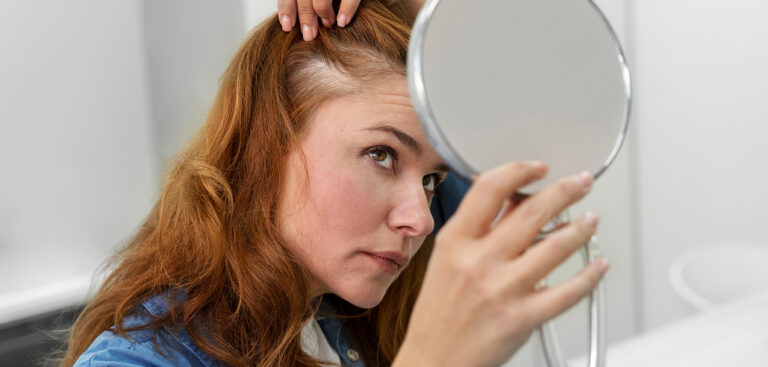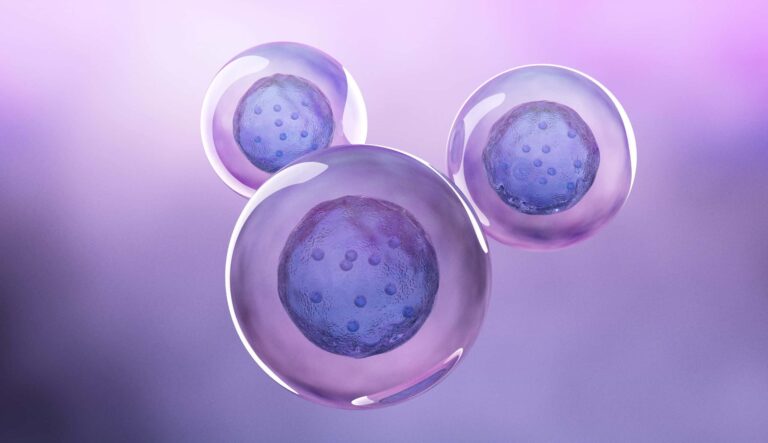On top of the hair loss, I was tired despite sleeping plenty. I didn’t feel like exercising despite being an exercise enthusiast. Simply put, I wasn’t myself. I, of course, checked my labs. Hello hypothyroidism. Okay, not what I wanted, but thyroid medication helped me feel better. But my hair kept shedding more than was comfortable for me.
I take lots of supplements to help my immune system and cellular function. But two years later, my menstrual cycles were wonky, brain fog set in, my joints ached, hot flashes woke me up at night, and the hair loss seemed to be accelerating. Labs showed menopause, then back to normal, then menopause—they were all over the place. At 42, perimenopause was weighing on me. Most symptoms resolved with lifestyle changes and hormone replacement therapy (HRT), but seriously, the hair loss was tough to get under control.
I’m not alone. You are not alone if you are in the 50% of women who experience noticeable hair loss. The years leading up to and after menopause are characterized by dramatic shifts in levels of female sex hormones. Those shifts affect each of us differently, and unfortunately, in some of us, those hair follicle receptors don’t like life after the reproductive years.
Hair Follicles and Hormones
Hair follicles, tiny organs under the skin that contain the root of the hair, have receptors for sex hormones like estrogen, testosterone, and other androgens. There isn’t much conclusive research on how female sex hormones specifically affect hair. However, some preliminary studies in mice and on skin cells suggest that estrogen affects hair growth, possibly stimulating it, and may also be responsible for maintaining the diameter of each strand of hair.
Do All Women Experience Hair Loss?
Absolutely not! While changes in hair follicles can be largely attributed to decreases in estrogen, not all women experience drastic hair loss. The extent can vary considerably from person to person. Estrogen alone is not the only factor; lifestyle, environmental exposures, diet, nutrient availability, gut microbiome, chronic disease state, medications, stress levels, genetics, and more can affect hair follicles, especially after age 40. Women who have experienced early onset menopause, polycystic ovarian disease, elevated androgen levels, and other menstrual irregularities have a high prevalence of experiencing hair loss.
How Does Estrogen Loss Affect Hair Follicles?
The menopausal hormone shift is complex, and every affected body system is still unknown. The current evidence leads to the assumption that the “menopausal transition” involves the hair follicles since it has been estimated that 50% of women will experience this symptom. It is hypothesized that estradiol extends the anagen (growth) phase of the hair cycle. This process may explain why hair renewal, growth, and thickness decrease, leading to thinner hair during menopause.
What Else Plays a Role in Hair Loss?
Androgens: Androgens, such as testosterone and dihydrotestosterone (DHT), play a significant role in hair loss. Increased levels of androgens can shrink hair follicles and shorten the hair growth cycle, leading to thinner, weaker hair and eventual hair loss. Androgen dominance occurs commonly in those suffering from polycystic ovarian syndrome, insulin resistance, and hormone imbalances that occur in perimenopause.
Progesterone: Progesterone helps balance the effects of androgens. Low levels of progesterone can allow androgens to dominate, contributing to hair thinning and loss.
Nutrients: Proper nutrition is vital for maintaining healthy hair. Deficiencies in the following vitamins and minerals can affect hair growth and maintenance:
- Iron: Essential for oxygen transport to hair follicles, promoting growth and strength.
- Vitamin D: Supports hair follicle cycling and new hair growth.
- Vitamin B2 (Riboflavin): Helps maintain healthy hair cells and supports energy production.
- Vitamin B3 (Niacin): Improves blood circulation to the scalp, promoting healthy hair growth.
- Vitamin B5 (Pantothenic Acid): Strengthens hair follicles and promotes hair growth.
- Biotin (Vitamin B7): Vital for keratin production, enhancing hair strength and growth.
- Vitamin B12: Supports the production of red blood cells, delivering oxygen to hair follicles.
- Vitamin C: Essential for collagen production, strengthening hair and preventing breakage.
- Vitamin A: Regulates the production of sebum, keeping hair moisturized and healthy.
- Vitamin E: Protects hair from oxidative stress and improves scalp circulation.
- Vitamin K: Helps with blood circulation, ensuring hair follicles receive necessary nutrients.
- Zinc: Supports hair tissue growth and repair and keeps oil glands around follicles working properly.
- Copper: Helps with the formation of hair follicles and maintains hair color.
- Selenium: Protects hair follicles from oxidative damage and supports new hair growth.
- Omega-3: Nourishes hair follicles, promoting healthy, strong hair.
Thyroid Disease: Thyroid disorders, such as hypothyroidism, Hashimoto’s thyroiditis, and hyperthyroidism, can significantly impact hair growth. Thyroid hormones regulate the production of energy in hair cells, and imbalances can lead to hair thinning and loss.
Chronic Diseases: Chronic diseases such as diabetes, autoimmune disorders, and hypercholesterolemia can disrupt the normal hair growth cycle, leading to hair loss. Managing these conditions can help mitigate their impact on hair health.
Stress: Stress is a significant factor in hair loss. Chronic stress can lead to a condition known as telogen effluvium, where a large number of hair follicles enter the resting phase and fall out prematurely. Stress management techniques such as mindfulness meditation, yoga, regular exercise, and adequate sleep are essential in combating stress-related hair loss.
Why Do Women Lose Their Hair as We Age?
As women age, varying hormone levels during menopause cause hair follicles to shrink, making hair grow finer (thinner). There are three types of hair loss in women:
- Androgenetic Alopecia/Female Pattern Alopecia/Female Pattern Hair Loss (FPHL)/Baldness: This is the most common type. Hair thins over the top of the head and on the sides.
- Anagen Effluvium: Medications cause this type because they compromise a growing hair follicle. An example is chemotherapy.
- Telogen Effluvium: An increased number of hair follicles reaching the telogen phase causes this type. This is the stage where hair falls out.
Can Hair Regrow During/After Perimenopause and Menopause?
Yes, hair can regrow during and after perimenopause and menopause, although the process can be challenging and may require a multifaceted approach. The regrowth of hair largely depends on the underlying causes of hair loss and the effectiveness of the treatment strategies implemented.
Seeking Medical Advice
When you approach your healthcare provider with a concern about hair loss, there are some clear protocols that they should follow:
Questions They Will Likely Ask You:
- What kinds of hair products do you use?
- What kinds of hairstyles do you wear?
- Has anyone in your immediate family experienced hair loss?
- Is there anything stressful going on in your life?
- What medications and supplements do you take every day?
- Has hair loss ever happened to you before?
- What foods are in your diet?
- How long have you been losing hair?
- Have you noticed hair loss in places other than your scalp, like your eyebrows, leg, and arm hair?
- Does anything worsen your hair loss?
- Does anything improve your hair loss?
- Have you noticed hair loss occasionally or has it been going on continuously?
- Have you noticed if your hair growth has changed?
- Has your hair been breaking more often?
Diagnostics and Tests:
- Pull test: gently pull on the hair to see how many detach
Examine the scalp for abnormalities
Blood tests: full panel to include micronutrients and minerals, hormone levels including thyroid panel, sex hormones, stress hormones, chronic disease biomarkers markers, inflammatory markers, Ferritin
What are the Treatments to Regrow Hair?
No single treatment works perfectly by itself. If you want the best possible outcome, you have to do as many of the things as you can. For me, I refined my nutrition and supplementation, I have had multiple rounds of PRP, I tried oral minoxidil and topical, I am on HRT, and most recently I am using microneedling and the ReVive product. I definitely have new growth, and I am starting to see thicker hairs popping through (although more are coming back gray ). Below I have outlined the treatments that you may want to consider too.
Hormone Replacement Therapy (HRT)
HRT can be an effective treatment for hair loss during perimenopause and menopause. Estrogen and progesterone therapies help balance hormone levels, which may stimulate hair follicles and promote hair growth. However, HRT is not suitable for everyone. Checking your hormone labs is a great place to start investigating with your healthcare provider.
Addressing Nutritional Deficiencies
Correcting nutritional deficiencies is crucial for hair regrowth. Ensuring adequate intake of essential vitamins and minerals, such as Vitamin B2, B3, B5, Biotin (B7), B12, Vitamin C, Vitamin A, Vitamin E, Vitamin K, Zinc, Iron, Copper, Selenium, Essential Fatty Acids, and Vitamin D, can support hair health and stimulate regrowth. If you are concerned that you’re not nutritionally sound, I would definitely suggest looking into Micronutrient testing.
Medications like minoxidil, spironolactone, and finasteride can help in regrowing hair. Minoxidil, in particular, is FDA-approved for treating female pattern hair loss and can be used topically or orally to stimulate hair follicles. Spironolactone and finasteride can help address androgen dominance if that is contributing to hair loss. A simple blood test can help determine if this might be a treatment consideration for you.
Innovative treatments like platelet-rich plasma (PRP) therapy, microneedling with plant-based stem cell products (such as DeRive), and injections with your own stem cells can promote hair regrowth by enhancing the hair follicles’ environment and stimulating new hair growth.
Lifestyle and Stress Management
Managing stress and maintaining a healthy lifestyle are vital components of any hair regrowth strategy. Stress can exacerbate hair loss, so incorporating stress-reduction techniques can significantly impact hair health.
A balanced diet rich in protein, healthy fats, and a variety of vegetables can support hair regrowth. Supplements tailored to individual deficiencies, such as multivitamins, iron, vitamin D, omega-3, and biotin, can also aid in restoring hair health. While I do not have an association, I have been using Nutrafol in addition to my regular multivitamin, and it has not only helped my hair growth, but improved my perimenopause symptoms.
Scalp Care and Treatments
Proper scalp care is essential for hair regrowth. Using gentle hair care products, avoiding harsh chemical treatments, and incorporating scalp massages can improve blood flow to hair follicles, promoting a healthy scalp environment conducive to hair regrowth. I also recommend having a dermatologist take a look at your scalp to ensure the proper environment is available for hair growth.
It’s important to note that hair regrowth can vary widely among individuals. While some women may experience significant improvement with the right combination of treatments, others may see more gradual changes. Consistency and patience are key, as hair regrowth can take several months to become noticeable.
Conclusion
Hair loss during perimenopause and menopause is a multifaceted issue that requires a comprehensive approach to treatment. By understanding the underlying factors, seeking appropriate medical advice, and adopting a combination of lifestyle changes and treatments, it is possible to manage and mitigate hair loss effectively. Remember, finding a provider who looks at you holistically and offers a multifaceted treatment plan can make all the difference in addressing this challenging condition.
Citations
Chaikittisilpa S, Rattanasirisin N, Panchaprateep R, Orprayoon N, Phutrakul P, Suwan A, Jaisamrarn U. Prevalence of female pattern hair loss in postmenopausal women: a cross-sectional study. Menopause. 2022 Feb 14;29(4):415-420. doi: 10.1097/GME.0000000000001927. PMID: 35357365.
Sinclair R, Patel M, Dawson TL Jr, Yazdabadi A, Yip L, Perez A, Rufaut NW. Hair loss in women: medical and cosmetic approaches to increase scalp hair fullness. Br J Dermatol. 2011 Dec;165 Suppl 3:12-8. doi: 10.1111/j.1365-2133.2011.10630.x. PMID: 22171680.
Rinaldi F, Trink A, Mondadori G, Giuliani G, Pinto D. The Menopausal Transition: Is the Hair Follicle “Going through Menopause”? Biomedicines. 2023 Nov 14;11(11):3041. doi: 10.3390/biomedicines11113041. PMID: 38002043; PMCID: PMC10669803.
Kamp E., Ashraf M., Musbahi E., DeGiovanni C. Menopause, Skin and Common Dermatoses. Part 1: Hair Disorders. Clin. Exp. Dermatol. 2022;47:2110–2116. doi: 10.1111/ced.15327.
Randall V. The Endocrine Control of the Hair Follicle. In: Blume-Peytavi U., Tosti A., Trüeb R., editors. Hair Growth and Disorders. Springer; Berlin/Heidelberg, Germany: 2008.
Thasneem K., Kalarani I.B., Jayaprasad P., Mohammed V., Veerabathiran R. Genes Linked with Early Menopause and the Pathogenesis of Its Associated Diseases: A Systematic Review. Middle East Fertil. Soc. J. 2022;27:2. doi: 10.1186/s43043-021-00093-0.






